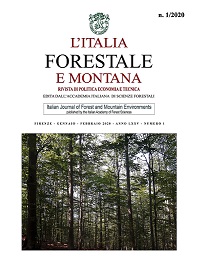Published 2020-03-02
Keywords
- biodiversity,
- systemic silviculture,
- fores management,
- rights of the forest
Copyright (c) 2020 Italian Journal of Forest and Mountain Environments

This work is licensed under a Creative Commons Attribution-NonCommercial 4.0 International License.
Abstract
Forest management has evolved from a typically productive approach, which evaluates silvicultural techniques and planning methods according to wood production levels, to the current approach where sustainability becomes the aim and social and environmental variables are fundamental.
Various questions related to biodiversity, preservation and active conservation of forest systems, are discussed. Active conservation of forest systems consists in systemic silviculture for natural forests, renaturalization for forests which have been heavily simplified by management in the past, and traditional silvicultural activities connected to local traditional knowledge where anthropologic, historical, cultural and landscape aspects are important.
Systemic silviculture considers the forest a complex biological system where humankind can intervene within the limits of the system’s functionality, without reducing complexity and biodiversity, i.e. respecting the rights of the forest.

